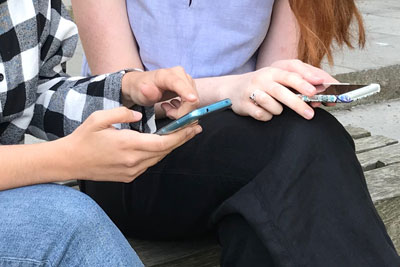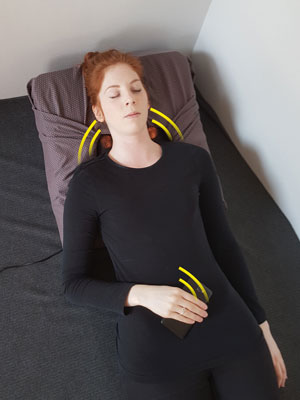Mobile in bed increases stress

Having trouble putting your mobile phone down when in bed? You are not alone. However, our smartphone use in bed often increases stress and gives us sleeping disorders.
In recent years, many of us have invited a new companion into the bedroom: the mobile phone. Since 2007, roughly when the smartphone gets its breakthrough, sleeping problems among young people have increased by 500 percent. Is there be a connection?
KTH students Agnes Comstedt and Ainhoa Martin Garcia have mapped the connection between the use of smartphones and stress and published the results in their master's thesis.
"Many of us have a hard time putting down our smartphone and getting the sleep we need. Stress, sleep and mental health are intimately linked", says Ainhoa Martin Garcia.
Through a series of in-depth interviews and by tracking the interviewees' mobile use, they have found a clear connection between sleeping problems and the usage of a smartphone in the evening. The students focus in particular on how we are affected by using the smartphone when we lie in bed, ready to go to sleep, a habit most of us have today.

"Just by having the mobile phone present in the bedroom creates stress. All interviewees who refrained from using the smartphone in bed had good night's sleep", says Agnes Comstedt.
What is it that we do that is so difficult to finish? Not very surprising, we get stuck in is social media, videos, chats, we listen to music and check calendars and tomorrow's weather, according to the two students.
What creates stress, says Agnes and Ainhoa, is having to react to notifications and messages, being too dependent on the smartphone, how social media makes us compare purselves ourselves to seemingly more successful people, and how they felt like they wasted time on their smartphone. And the feeling of wasting time on their smarphone.

"Someone compared the frequent checking of the phone with being bored and opening the fridge despite being there five minutes ago - you keep checking it even if nothing’s happened", says Ainhoa Martin Garcia.
However, there is a reason for the difficulties we have to break these habits. Mobile content is often designed to trigger our reward system. At the same time, the technology is here to stay, so what to do if you want help putting an end to mobile surfing in bed?
"Breaking people's habits is a chapter of its own, and today there are many apps that want to reduce our mobile dependency. 'Digital detox' is a well-known concept. In our work, we have tried to find better ways to use the smartphone. We want to make your phone something you want to use in a completely different - and positive - way", says Agnes Comstedt.
Agnes and Ainhoa's solution is a massage pillow with built-in heat that is controlled by how the user touches the smartphone.
"You give yourself a nice massage before falling asleep. And we promise: it's a really good massage!"
Text: Anna Gullers

